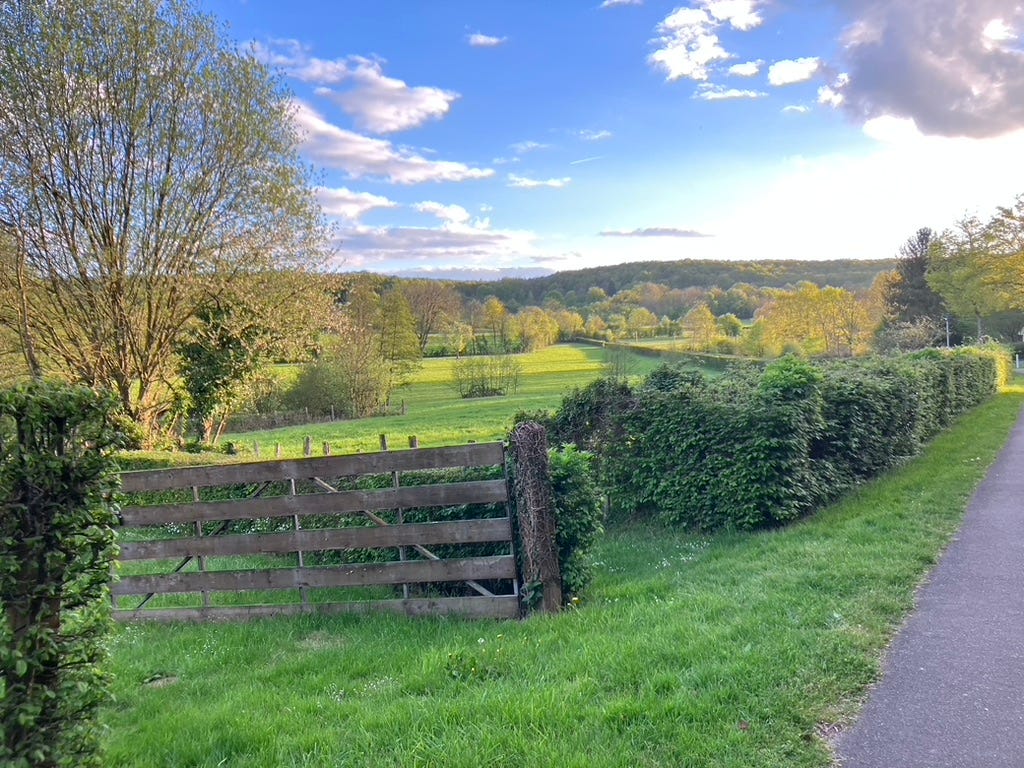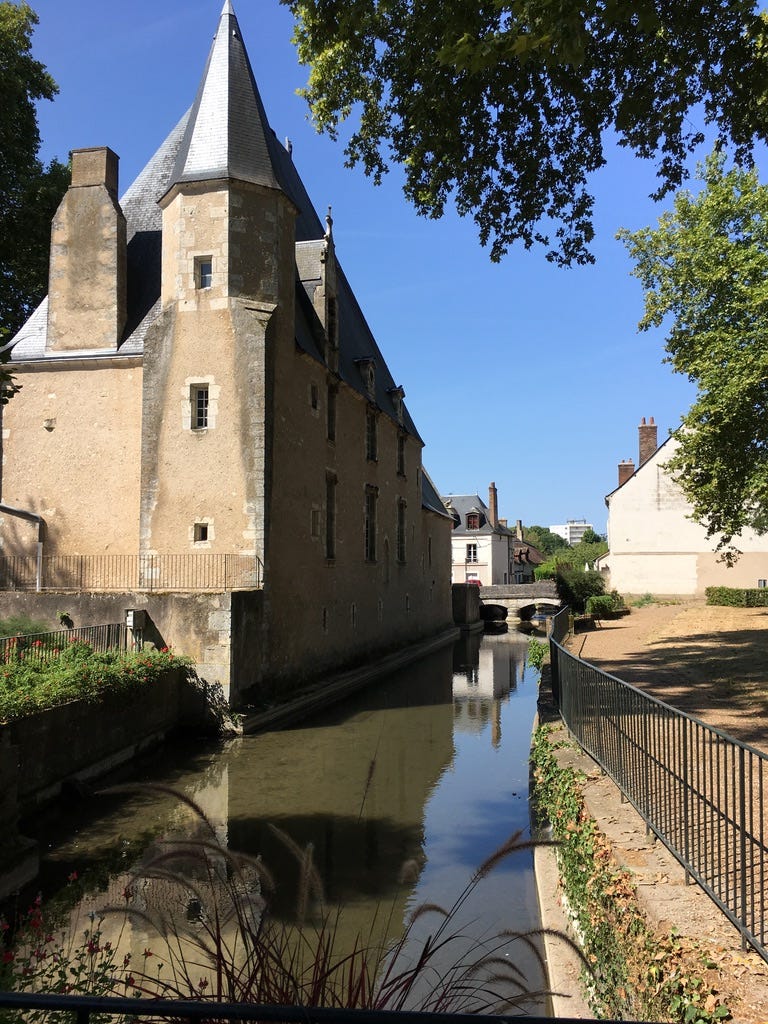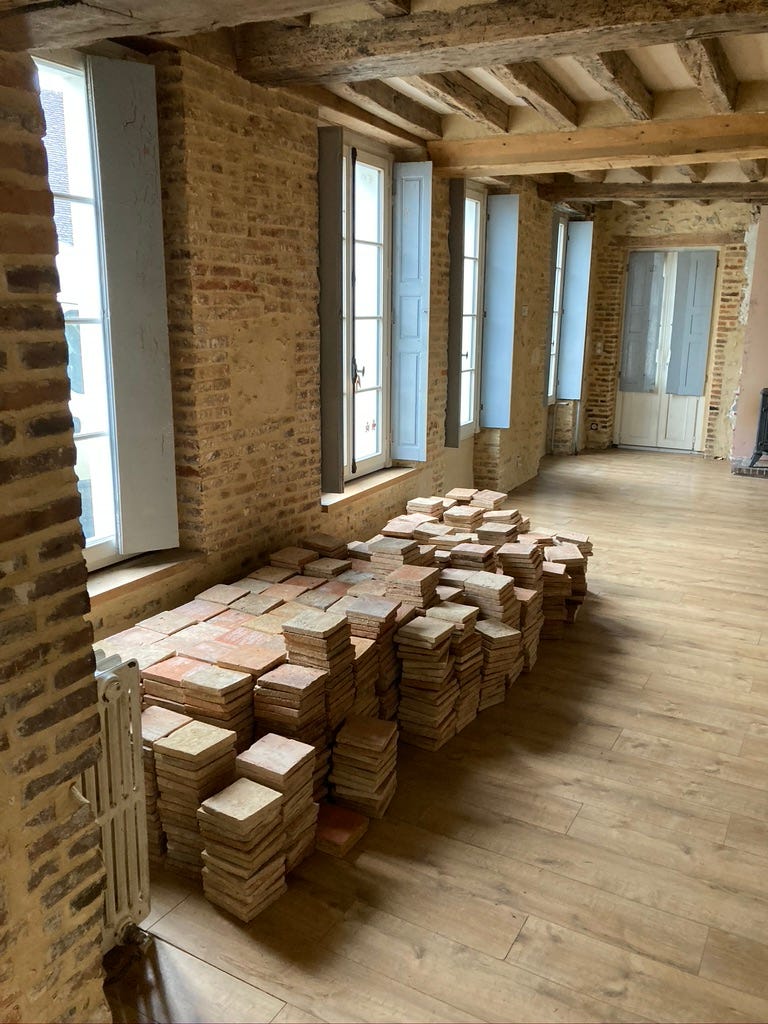Chapter Twenty-Two: Bonjour*
*What you say to new people when you first meet, because “enchanté” is actually considered kind of smarmy.
A certain notoriety comes when you buy the most central house in a village. Even before anyone’s shaken your hand, they know you’re coming, and you’re an object of curiosity. This is true especially if you’re a single American woman who has chosen a very sparsely populated corner of France in which to live and work full time. On a visit to Saint-Maxime to meet with Marina and Marius to discuss the thorny question of replacing the new house’s ground floor, my soon-to-be across the street neighbor saw my car in the backyard, and popped over to introduce herself.
A sweet high school German teacher on the verge of retirement, Angelique was from a family of successful local artisans with a pretty big footprint in the valley, but the dozen years she spent living in Hamburg when she was in her forties lent her a slightly more worldly air. She had a short haircut, dyed-bright red, she liked a pastel sequin, and she kept herself fit enough to leave the house in short shorts, as she was wearing today. She was pleased to learn I planned to live in the house full time, like she did, since most of the homeowners in town were weekenders. “People get into each other’s business in a village,” she warned with a rueful laugh. “You’ll see.” Angelique said I should come over for a drink anytime, and suggested we exchange keys. She was clearly shy like me but I would go over there as soon as I could. In a tiny town, how you first show up is everything.
Marina nixed my idea to do a poured concrete floor with underfloor heating in the massive, drafty living room on the ground floor. It’d crack, she said, and the square footage was too much for electric, so we’d have to install a network of pipes to run hot water through, which would cost a fortune. Plus she hated mixing metaphors by adding something so Parisian-contemporary to an old village house. What was I trying to do? Open an art gallery? No. So I turned to Le Bon Coin, best friend of all renovators, to see what was happening on the récup market. Récup is the offhand house-trade way to say recuperation, and it’s a national sport in France.
News flash, there are a lot of old, falling-apart houses in the countryside here. Second news flash: they don’t make things like they used to, so a profession of pickers has sprung up repurposing the old bones of these ancient piles, saving treasures like hard-as-steel French oak antique doors or floor tiles or carved stone trimming or wrought iron railings. My ex, a production designer for low budget indie movies, always needed cheap, vintage-y ways to decorate sets, and so was very well versed in the world of récup. We scavenged a bunch of 19th century wooden shades to turn into closet doors at our old place in Paris. They weighed a ton and they were the pride of the house. Monsieur had put what looked like recuperated armoire doors on several of the shakily built closets and too-short passageways in the house in Saint-Maxime. They might all have to go, but not before I eyeballed them to see if we could récup any of his récup for ourselves. Marina just rolled her eyes and lit another cigarette. “Give me a break,” she said. “Those are made for a dwarf.” She let me hang onto one pair that covered an inadequate closet in what would soon become my bedroom.
Norman houses traditionally have terra cotta tile floors called tommettes, but large lots of them in decent shape were getting hard to come by cheaply, routinely costing more than new oak. Finally I found a listing down about two hours south from me in the Loire Valley for pale-colored square tommettes at an unheard-of €35 per square meter, half the going rate at the time. So I shot down south on a Saturday afternoon to meet Bobby and check out the goods. (Pronounce that in French please: “Bohbiiieeee.”) He was from down there, where I guess an unironic Elvis quiff was a feasible look for a 35-year-old tradesman. Hard to tell his age, actually, as the copious cigarettes could have added another ten to the tally.
Bobby was surprised to see a woman alight from the car to inspect his merch, so he was solicitous and gentlemanly as he showed me around the muddy vacant lot he used as storage. It was a graveyard for the odds and ends of once noble dwellings. An iron gate perched crookedly, covered in rust. There was a haphazard pile of Burgundian cornerstones. And tommettes everywhere, in varying sized hills. He showed me to mine, and they were absolutely lovely in person, lighter by several shades from the standard issue deep brick: on the spectrum of pale peach and ochre and taupe. They’d make the room lighter and airier, and played perfectly off the peachy colored mortar that held the exposed brick and stone of the walls together. This was a miracle.
Even so, my ex had trained me never to accept the first price on the LBC (sorry, Snoop), so I bargained Bobby down a little. He engaged with the bemusement of the B characters of Mad Men when faced with a woman asking for something. “Sure honey, aren’t you cute, yes I’ll do you a favor.” If that’s how he wanted to play it, fine by me. I don’t have to become his friend. I got him to throw in free delivery, and we shook hands. He’d load up his van, which was heavy duty enough to transport two literal tons of baked clay, and meet me at the house the following Sunday, the day before Marina’s two Moldavian workers Lilian and Paul were set to move into my future office on the first floor and start swinging hammers.
Bobby and what looked to be his hungover biker wife pulled up to the front of my house in a banged up panel van at 10am on the appointed day. I made the dumb city person assumption that delivery included unloading, but Bobby clearly had another vision for how it would go. I shrugged and told him that the only help he’d be getting with these easily breakable tiles was from me, the narrow-shouldered clueless middle aged lady he met the other day, now smiling defensively, and way too much. I tried to make a good show of hauling in stacks of five or six tiles at a time, and setting them down in an orderly corner of the room, but by the third trip to the van my lower back was already giving out and there would be 57 more trips from the look of things.
It was then I met my second maximienne, as the townspeople are called. A wide-eyed, coltish girl who looked to be 15 bopped over towards the van from the cluster of houses just north of mine to introduce herself as Lucie and ask, “Do you need some help?”
Ohmigod yes. Bobby rolled his eyes at the sight of another female of the species, but she turned out to be really strong. We threw ourselves into the task as if to make a point. I couldn’t believe my luck.
“It’s OK,” Lucie smiled as I thanked her for the fortieth time. “Everyone tells me I’m very helpful.”
“That is a nice thing to be,” I replied with the affect of a junior college teacher of women’s studies. “But only if you want to.” I pictured having young Lucie over for tea as I imparted feminist wisdom to help guide her on her path. Who are you kidding? I reminded myself. You don’t even have your closest friends over for tea.
“I heard you were American,” she said. “You don’t have that much of an accent.”
“Thank you, but I surely do.”
“I admire Americans,” she said, with the seriousness of an applicant to the model UN. “I have great respect for your people.”
“Not all of us, I hope.”
While Lucie and I were stacking tile, she told me she liked the former owners of my house. “I mean the wife could be kind of tough,” she said, wrinkling her nose. Always be nice, I repeated to myself silently, realizing in that moment that I wanted to make my fellow villagers like their new neighbor more than the last ones. (Why? Who cares? Because I am naturally competitive even if I mostly try to bury it under cheap morality.) Even then I knew this was a fool’s errand. Monsieur was kind of a legend. Perpetually smiling even if down on his luck, a big lover of whisky and Coke, ever willing to lend a hand to patch a leak or put up some drywall. These skills were not in my neighborly toolbox.
Once we had finally discharged everything a few hours later, Bobby’s eternally patient wife stubbed out her last cigarette in the van’s ashtray, and I asked Lucie if Bobby and I could come over to her place to wash our hands, as the water didn’t seem to be entirely hooked up yet at mine. There was a massive “Beware of Dog” sign on the front door, and the plasterwork was falling off of some of the façade. Their place was about half the size of mine, which made me feel excessive. Why does this single lady need so much space? Because she needs to be able to lodge anyone she can wangle out of Paris, and because, standing on Lucie’s doorstep, she realized in that moment she was competing with her ex, whose new apartment was half the size of this place. (House buying should be rational. It isn’t.)
Lucie’s grandmother Maribel begged for five minutes to straighten up, and then let us into a small kitchen just past the front door. It had blood red cabinets, and every surface was covered in newspapers and coupons and calendars. It didn’t look great, but then neither did my paper-strewn kitchen island back in Saint-Jouin, and it’s not like she was expecting company. She found us a clean dishtowel and I told her how sweet and helpful Lucie was, and that I looked forward to being able to have them over for coffee when the house was further along. The look on her face as she handed me a post-it note with the water department’s phone number said, fat chance.







Thank you! The guys did a fantastic job laying them in, without getting ahead of ourselves.
Not just an insight but so humerous too
- the Elvis quiff! 😁. I hope we hear more - the ups and downs as well as the delights of living in rural France!